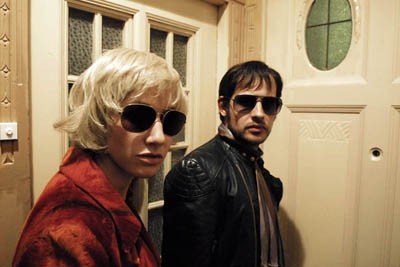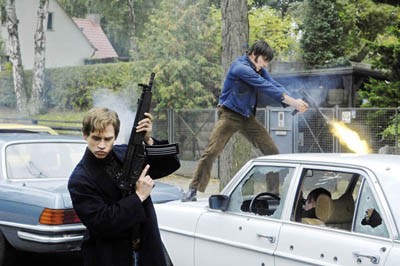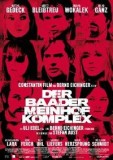| Reviews & Columns |
|
Reviews DVD TV on DVD Blu-ray 4K UHD International DVDs In Theaters Reviews by Studio Video Games Features Collector Series DVDs Easter Egg Database Interviews DVD Talk Radio Feature Articles Columns Anime Talk DVD Savant Horror DVDs The M.O.D. Squad Art House HD Talk Silent DVD
|
DVD Talk Forum |
|
|
| Resources |
|
DVD Price Search Customer Service #'s RCE Info Links |
|
Columns
|
|
|
Baader Meinhof Complex, The

Despite the peace and love vibe that permeates most of the mythology of the 1960s (see, for example, Ang Lee's Taking Woodstock), the political unrest ran to much deeper and darker places. There weren't just peaceful protests, but violent acts of resistance, as well. In the U.S, we had groups like the Weather Underground, and in Europe there was the Red Army Faction. Both believed that true social change would not come as a result of slogans and folk music. Governments would only topple and the oppressors would only listen if you showed them you were willing to do anything. A core section of the RAF was named the Baader Meinhof Group after its two leaders, and it's the subject of Uli Edel's The Baader Meinhof Complex. Hailed as Germany's submission to the Oscars earlier this year, the film has taken its sweet time getting into American theatres, but it's here at last.
The story begins in 1967, when journalist Ulrike Meinhof (Martina Gedeck, The Lives of Others) and radical activist Andreas Baader (Moritz Bleibtreu, Munich) represented two sides of the pro-Communist movement. Incensed by America's involvement in Vietnam and their continued presence on German soil, students and ideologues were gathering en masse to stage protests, often meeting with brutal police opposition. Though Meinhof regularly wrote articles praising the more active members of the protest movement, she never really took action herself until a growing disillusionment with the intellectual side of the equation and a chance encounter with Gudrun Ensslin (Johanna Wokalek, Aimee & Jaguar), Andreas Baader's true-believer girlfriend, put her in a position to help. Ulrike Meinhof set up a ruse to get the imprisoned Baader away from the jail for a day so that Gundrun and her associates could break him out. Instead of staying behind after the deadly raid, Meinhof went with them.
For the next several years, the Baader Meinhof collective put their propaganda on the streets. They robbed banks to cripple the capitalist system and bombed several U.S. Army installations. They gained pubic notoriety, becoming folk heroes of a sort to a good portion of the German populace, and inspiring a complex manhunt coordinated by the Director of the German Police, Horst Herold (Bruno Ganz, Wings of Desire). The first half of The Baader Meinhof Complex is concerned with the organization's campaign of terror, the second half details the imprisonment of its key leaders, including Ensslin, Baader, and Meinhof, and the attempts by their followers to keep the movement alive and spring their mentors from jail. The trials and the attacks carried on throughout the 1970s.

The Baader Meinhof Complex is produced by Bernd Eichinger, who also wrote the script, adapting a book by Stefan Aust with the aid of director Uli Edel. Prior to this film, Eichinger also wrote and produced Downfall, the acclaimed recreation of Hitler's final days (also starring Bruno Ganz). That film was noteworthy for its dry docudrama style. Eichinger and director Oliver Hirschbiegel applied a journalistic rigor to Downfall, avoiding extraneous point of view and filmmaker editorializing. It was quite a challenge: make a film about perhaps the world's most hated historical figure and suck the emotion and the politics out of it. I found it to be interesting, but short of the mark. It was too bloodless, too beholden to its aesthetic conceit.
Thankfully, the same approach pays off big in The Baader Meinhof Complex. The more intricate story, with its evolving cast of characters and multiple narrative lines lends itself much better to a procedural of this kind. Eichinger and Edel build their story piece by piece, concerned only with the present, not mired in the past that got these people here or the future consequences. Personalities are only explored in terms of pathology, each person defined by the choices they make.
This allows for the filmmakers to avoid any semblance of turning these killers into heroes. In fact, they are far from it. Ulrike Meinhof comes off as confused and weak-willed, never quite sure of the courage of her convictions. She's the one who can talk a good game, but who finds the philosophy harder to enact. Her devotion is intellectual, and that isn't necessarily as strong as someone whose belief is more visceral. Andreas Baader was a man who accepted no compromise. He's a bit of a prick, really, and possibly a borderline sociopath. He wants what he wants and is prone to tantrums when he doesn't get it. Getting along with others only counts when he's the dominant figure. Surprisingly, his love affair with Gudrun Ensslin even survives through prison. I guess righteous belief is a pretty good bond, they are kind of like a political Bonnie and Clyde. Or maybe the couple from Joseph H. Lewis' Gun Crazy.
Even if the folks behind The Baader Meinhof Complex aren't pushing any political agenda, I admit to finding it hard not to compare the events depicted to our present climate. A montage of key moments of the 1960s that illustrated the change in the air and the feeling that that there was no turning softly back to old values is unnerving. The RAF thought what they were doing was right, and they were willing to do some reprehensible things to get their point across. We may think we've progressed pretty far in the last several decades, but turn on the news after watching The Baader Meinhof Complex and the past doesn't seem that distant. It's also good to remember that not all terrorists have darker skin or wear turbans, regardless of what some folks would have us believe.
Not to grind too heavy a saw or anything. I just can't help but think this is partially Eichinger's intention in making movies like The Baader Meinhof Complex and Downfall. By showing us the events in a seemingly dispassionate fashion, he keeps the blood from boiling and shows us how easily the world can turn in the wrong direction. Hell, there are points where these guys even sound reasonable. What the movie reminds us, and expertly so, is how regardless of how such things begin, they can only end one way. It's a testament to all involved, from the writing up through the staging and the acting, that the work is so good that it makes the audience forget that what they are seeing isn't real so that we all might remember that it actually once was.
Jamie S. Rich is a novelist and comic book writer. He is best known for his collaborations with Joelle Jones, including the hardboiled crime comic book You Have Killed Me, the challenging romance 12 Reasons Why I Love Her, and the 2007 prose novel Have You Seen the Horizon Lately?, for which Jones did the cover. All three were published by Oni Press. His most recent projects include the futuristic romance A Boy and a Girl with Natalie Nourigat; Archer Coe and the Thousand Natural Shocks, a loopy crime tale drawn by Dan Christensen; and the horror miniseries Madame Frankenstein, a collaboration with Megan Levens. Follow Rich's blog at Confessions123.com.
|
| Popular Reviews |
| Sponsored Links |
|
|
| Sponsored Links |
|
|
| Release List | Reviews | Shop | Newsletter | Forum | DVD Giveaways | Blu-Ray | Advertise |
|
Copyright 2024 DVDTalk.com All Rights Reserved. Legal Info, Privacy Policy, Terms of Use,
Manage Preferences,
Your Privacy Choices | |||||||










